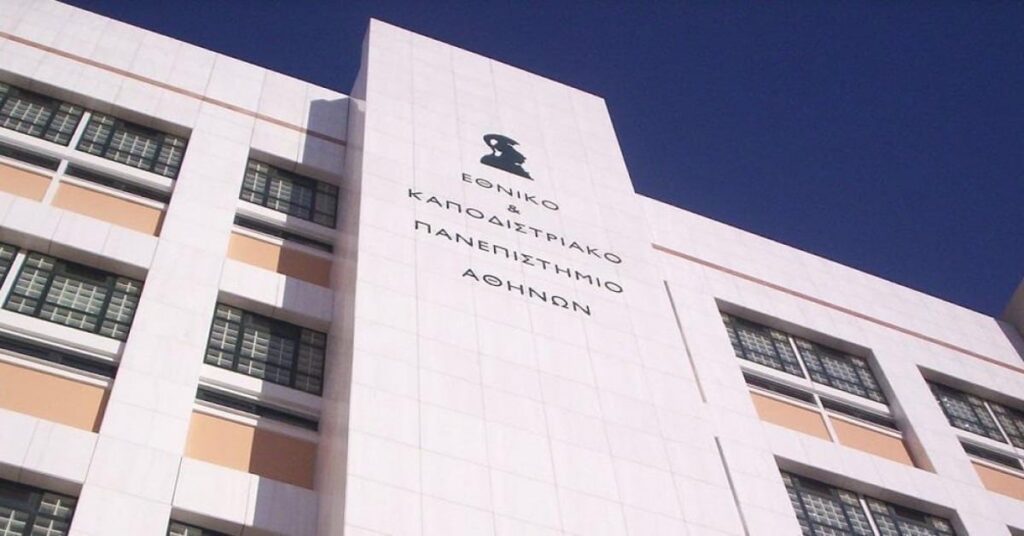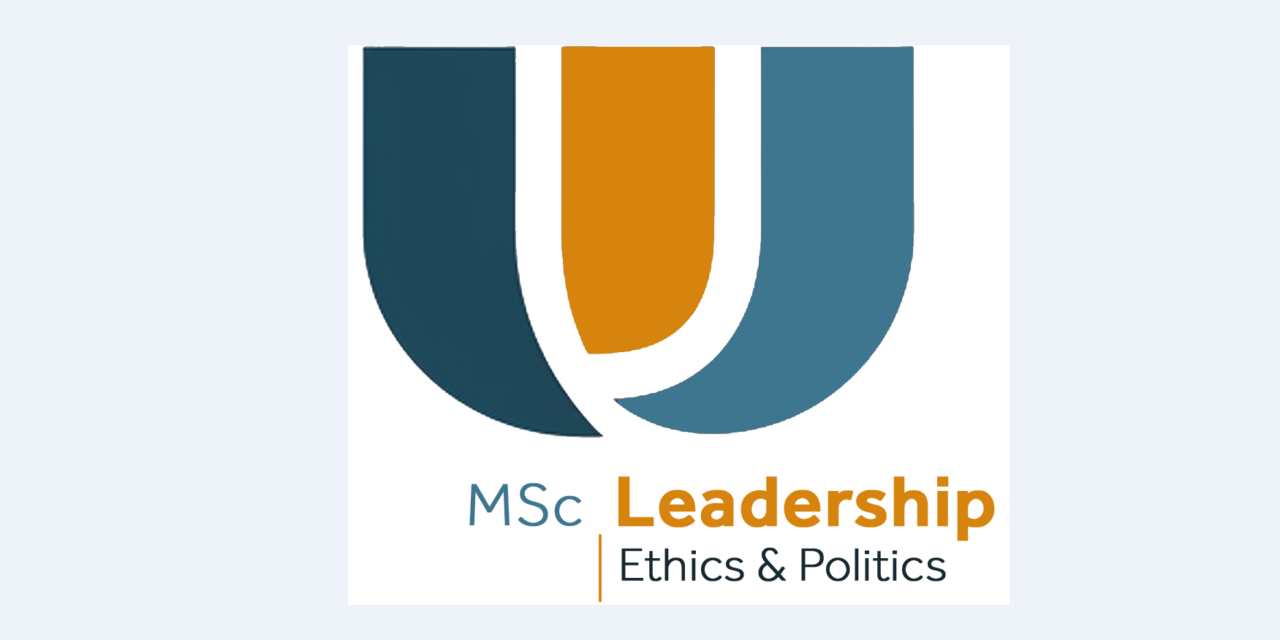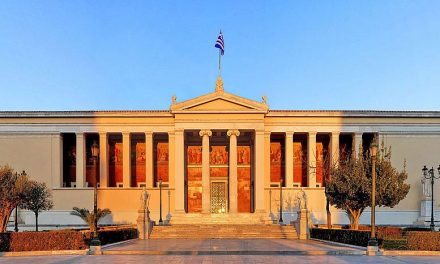The web portal Study in Greece is campaigning for the promotion and international visibility of Greek Universities and the comparative educational advantages of our country. In particular, the campaign focuses on the foreign language study programs that Greek Universities offer to Greek and international students. The initiative is supported by the General Secretariat of Higher Education of the Ministry of Education and Religious Affairs and the General Secretariat for Greeks Abroad and Public Diplomacy of the Ministry for Foreign Affairs. In this context, a number of educational programs and actions are presented in detail on a regular basis, such as undergraduate and postgraduate programs, summer schools etc, to inform international students about the many foreign language options offered by Greek Universities.

Study in Greece interviewed Professor Evangelos Protopapadakis, Director of the MSc in Leadership: Ethics and Politics, an international graduate program organized by the National and Kapodistrian University of Athens, Greece, University of Kurdistan Hewlêr, and University of Sulaimani, Iraq.
Evangelos D. Protopapadakis is a Professor of Applied Ethics (National and Kapodistrian University of Athens), Director of the NKUA Applied Philosophy Research Laboratory, Member of the Hellenic National Commission for Bioethics and Technoethics, Head of the Greek Unit of the International Chair in Bioethics (WMA Cooperation Center) and the Director of the brand-new MSc in Leadership: Ethics and Politics. He has published 4 monographs in Greek and 2 in English as the single author, and 12 edited volumes as the editor or the co-editor: 5 in English, 1 in Serbian, and 6 in Greek. He has published more than 70 papers in domestic or international scientific journals and volumes.
Prof. Protopapadakis, can you provide an overview of the MSc in Leadership: Ethics and Politics program and its primary objectives?
The MSc in Leadership: Ethics and Politics is an interdisciplinary graduate program designed to explore the complex interrelations between leadership, ethical considerations, and political dynamics. It aims to equip students with the theoretical knowledge and practical skills necessary to navigate and influence the moral and political dimensions of leadership in various sectors, including public service, non-profit organizations, and private enterprises. The program’s primary objectives are to:
a. develop ethical leaders, by instilling a deep understanding of moral principles and ethical decision-making processes,
b. enhance political acumen, by training students to navigate complex political landscapes and understand the interplay between politics and leadership, including the ability to engage with political stakeholders, influence policy, and advocate for social and political change,
c. foster critical thinking and analytical skills, by developing students’ ability to critically assess leadership practices, ethical dilemmas, and political scenarios, and encouraging them to question assumptions and consider multiple perspectives,
d. prepare students for diverse leadership roles, by equipping them to take on leadership positions in various sectors, including government, non-profits, international organizations, and business,
e. promote social responsibility, by encouraging students to consider the broader social impact of their actions and to strive for positive change in their communities and beyond.
Overall, the MSc in Leadership: Ethics and Politics aims to produce leaders who can make ethically sound decisions, understand the complexities of political environments, and lead with integrity and purpose. The program is ideal for individuals seeking to deepen their understanding of leadership’s ethical and political dimensions and to enhance their ability to lead effectively in various contexts.
What differentiates this program from other leadership or political science master’s programs?
The MSc in Leadership: Ethics and Politics distinguishes itself from typical leadership or political science master’s programs through its unique interdisciplinary approach and cross-cultural collaboration. Unlike standard programs that often focus exclusively on leadership theories or political frameworks, this program integrates ethics as a core component, emphasizing the moral responsibilities of leaders. It is offered jointly by the National and Kapodistrian University of Athens, the University of Kurdistan Hewlêr, and the University of Sulaimani, providing a rich blend of European and Middle Eastern perspectives. This geographic and cultural diversity allows students to explore leadership and political dynamics in both Western and non-Western contexts, offering a comparative and global outlook. Additionally, the program’s focus on real-world applications, including case studies and fieldwork, prepares graduates to handle complex ethical dilemmas and political challenges practically and sensitively. This holistic and global approach to leadership education makes the program particularly relevant for those seeking to understand and lead in a diverse, interconnected world.

What are the core components of the curriculum, and how does it integrate ethics, leadership, and politics?
The core components of the curriculum are:
a. Leadership Theory and Practice: The program delves into contemporary and classical leadership theories, examining how leaders inspire, influence, and direct individuals and groups. It also explores practical leadership skills, such as strategic decision-making, communication, and conflict resolution.
b. Ethical Frameworks: Students are introduced to various ethical theories and frameworks, including deontological, consequentialist, and virtue ethics. The program emphasizes the importance of ethical decision-making and integrity in leadership roles.
c. Political Contexts: The curriculum covers the political environments in which leaders operate, focusing on the impact of political systems, policies, and power dynamics. This includes an understanding of political institutions, governance structures, and the role of public opinion.
d. Interdisciplinary Approach: The program integrates insights from philosophy, political science, sociology, and management studies, providing a comprehensive understanding of the ethical and political challenges in leadership.
e. Research and Analytical Skills: Students engage in research projects and case studies, honing their analytical abilities and critical thinking skills. The program typically includes a capstone project or thesis, allowing students to explore a specific issue in depth.
The MSc in Leadership: Ethics and Politics integrates these three core areas through a comprehensive, interdisciplinary approach. The MSc in Leadership: Ethics and Politics creates a cohesive educational experience by interweaving these three areas throughout its curriculum and activities. This integration helps students develop a holistic understanding of the challenges and responsibilities they will face as leaders, preparing them to navigate the ethical and political complexities of leadership roles across various sectors.
What unique benefits does the collaboration between the National and Kapodistrian University of Athens, the University of Kurdistan Hewlêr, and the University of Sulaimani bring to this program?
As Greece’s oldest and most prestigious institution, the National and Kapodistrian University of Athens brings a rich tradition of classical education and philosophical thought. This contributes a strong foundation in ethical theory and political philosophy, offering a European perspective on governance and ethics. On the other hand, the University of Kurdistan Hewlêr and the University of Sulaimani offer valuable insights into the political, cultural, and social dynamics of the Middle East, particularly the Kurdish region. They provide expertise in regional studies, conflict resolution, and the complexities of leadership in transitional societies. This collaboration facilitates:
a. diverse academic perspectives,
b. cross-cultural exchange and understanding,
c. broadened research opportunities,
d. practical exposure,
e. networking,
f. global and regional expertise, and
g. enhanced career opportunities.

How does this joint MSc program contribute to the discourse on global leadership, ethics, and politics?
The joint MSc program in Leadership: Ethics and Politics, offered by the National and Kapodistrian University of Athens, the University of Kurdistan Hewlêr, and the University of Sulaimani, makes significant contributions to the discourse on global leadership, ethics, and politics by:
a. integrating insights from diverse academic traditions – European and Middle Eastern,
b. exploring how different cultural, religious, and philosophical traditions inform ethical leadership and decision-making,
c. addressing pressing global challenges such as globalization, migration, climate change, and digital transformation, while also delving into regional issues pertinent to the Middle East, such as conflict resolution, governance in transitional societies, and the ethics of international intervention,
d. promoting inclusive models that are sensitive to gender, cultural diversity, and minority rights, which is particularly important in the Middle Eastern context, where societal and political structures are often in flux, and there is a critical need for leadership that can navigate these complexities with an ethical and inclusive approach.
e. addressing ethical leadership in conflict zones, the role of culture in shaping political leadership, and the impact of ethical governance on social justice,
f. fostering a network of scholars, practitioners, and students who are actively engaged in discussions on leadership, ethics, and politics,
g. educating students to think critically about the ethical dimensions of leadership and the political implications of their actions in international relations, global governance, and multinational organizations.
In summary, this joint MSc program enriches the global discourse on leadership, ethics, and politics by offering a unique blend of interdisciplinary knowledge, cross-cultural understanding, and practical application.

Could you provide an overview of the key facilities at the National and Kapodistrian University of Athens, the University of Kurdistan Hewlêr, and the University of Sulaimani that support the MSc in Leadership: Ethics and Politics program, and explain how these facilities enhance the academic experience for students?
The National and Kapodistrian University of Athens boasts an extensive network of libraries, including the state-of-the-art Library of the School of Philosophy, offering access to a vast collection of books, journals, and digital resources. This wealth of materials supports in-depth research in leadership, ethics, and political science, providing students with access to both historical texts and contemporary studies. The University hosts several research centers, such as the NKUA Applied Philosophy Research Laboratory, that facilitate advanced research and provide platforms for students to engage in cutting-edge discussions and projects, particularly in ethical and political issues. The NKUA provides state-of-the-art technological facilities, including computer labs and digital classrooms, which enhance learning through the use of modern educational technologies. These facilities enable virtual seminars and collaborative projects with partner universities, and enable at the same time distance and asynchronous teaching, which is a key element of this program that facilitates flexibility and allows students to choose their own pace.
The University of Kurdistan Hewlêr offers a modern campus with well-equipped classrooms, lecture halls, and seminar rooms that support interactive learning. The availability of spaces designed for group work fosters collaboration among students. The UKH Library provides access to a comprehensive range of books, academic journals, and electronic databases. These resources are essential for students conducting research on regional and international political issues and leadership challenges.
The University of Sulaimani offers a variety of academic facilities, including lecture theaters and specialized seminar rooms, designed to support a range of teaching methods from traditional lectures to interactive discussions and group work. The library is a crucial resource, offering a wide collection of books, journals, and digital resources relevant to leadership, ethics, and political studies. It supports students’ research needs and access to regional and international literature. The university houses research centers that focus on social sciences and humanities, providing a rich environment for academic inquiry. These centers facilitate workshops, seminars, and conferences, enhancing the academic experience by exposing students to ongoing research and scholarly debates.
Applications are open until 29 September.
TAGS: STUDY IN GREECE














